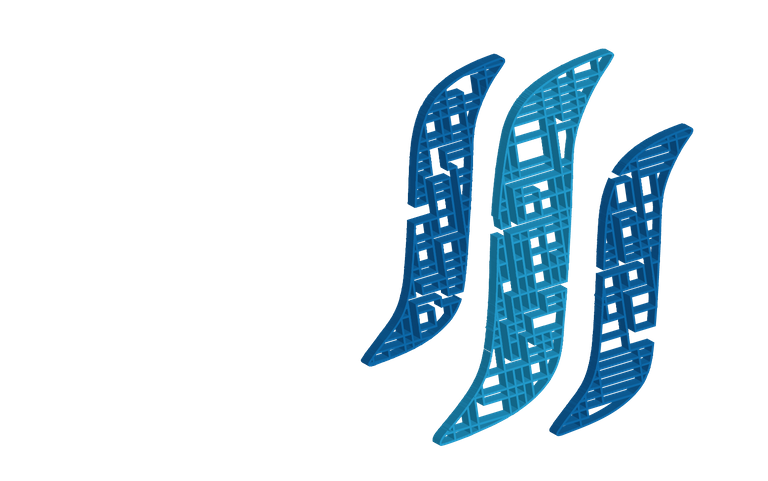What Does Decentralization Mean To Me: Risk management through broad spectrum experimentation and distributed learning
I have been on Steem for 3+ years, but I have been around decentralization a fair bit longer, though I hadn't really thought about it with as much energy and effort as I have seen taking this blockchain journey.
The old saying, "Don't put all your eggs in one basket" is true for a reason, as if you drop the basket, all eggs are lost, and this is one of the cores of decentralization, risk management of assets. While this could be spreading financial value across class and type of investment vehicles and risk profiles to limit liability, it also applies to social groups and evolutionary branches that evolve for changing conditions.

Which leads to the next core of decentralization I see as valuable, the spread of trial and error experimentation, which diversifies the trials across location, conditions and methodology. This allows for a great deal of data to be created that can be leveraged for learning.
The third core I will mention is, the ability of what is learned to be distributed throughout the decentralized network so that what one data set of variables from a node discovers, can be used to strengthen the next trials of other nodes on the network. This creates a lot of errors, but also a great deal of value in both reducing the costs of failure, but being able to speed the innovation process through competing ideas running simultaneously.
So, here are three points that I see as core strengths of decentralization.
- Risk management of resources
- Broad-Spectrum Experimentation
- Distribution of learning
Now, the Steem blockchain technology provides anyone the ability to participate at a multitude of levels and combinations of these three things. For example, this post is protected through the decentralized network of witnesses that each hold a copy of it and can verify it against other copies to ensure integrity. The Steem applications run like individual experiments in the ecosystem to accomplish their goals, with usage giving feedback data that can be used to evolve the idea further. And, what works and does not is all connected to the same infrastructure, the same neural network that distributes the learning the network so other nodes can adjust without having to do the tests themselves.
I see Steem like a spider web with each knot in the network being an account of some kind with some number of connections in and out. As interactions happen to a node, it triggers a vibration out that will affect the entire web. However, the loss of one or several nodes can be absorbed into the network or replaced at low cost. This means that the integrity of the web can remain solid, even though the nodes can come and go. This provides network stability to evolve upon and carry messages for the next evolutionary change.
What these three things do when working in unison is create a dynamic ecosystem that mimics an organic process of evolution, and the more participants and further the distribution of nodes, tests, conditions and methodology that can be connected upon the same infrastructure, the more robust the system becomes and the greater the adaptability and resilience to external forces, as an external force can't easily put pressure on every node at once.

This creates a secure system that can face multiple challenges on multiple fronts, which also makes a system that can scale to needs of changing conditions, by broadcasting information with speed through the entire network and triggering a response. Security, Scalability for needs, Speed of information transfer. These are fundamental to the technology of blockchain and hard to achieve, but they are also fundamental to the requirements of a strong community, economy and individual.
Decentralized blockchains like Steem can provide security to users through distributed ownership of the network, scalability for a wide range of experiences, and access to and speed of learning from multiple verifiable points that greatly lower the risks of information contamination.
This is juxtaposed against centralized ecosystems where individuals are bound to the whims of the ruling force that is incentivized to do what is in its own best interest and therefore contaminate the flow of information to suit its own ends.
The problem with decentralization is that it is messy, unpredictable and often volatile as there is a constant process of birth, death and evolution ongoing - just like nature itself. It is a wild animal of sorts and rather than being whipped and driven into submission by the few, it becomes the voice of the many, with each having an effect on the information the network holds and transmits.

In my opinion, in time the decentralized blockchain technology can fundamentally change the way we live our lives by being able to much more precisely track the real value of what we do and hold dear to us through wide participation and value distribution across the nodes, rather than rely on the manipulations of narrow marketplaces designed to push enormous value to a few central points.
For me, this is important because it can potentially rebalance value and its distribution through a system that can be verified through trustless mechanisms. Due to the nature of the blockchain itself, it can mean that the peaks of wealth that we see today will no longer be possible as once the imbalance forms, participants have the economic mobility to shift their attention and value elsewhere if they choose. In time, this generates massive value, but far smaller gaps between the peaks and troughs of participants themselves and their experience in life.
Equality doesn't exist, but better distribution is possible - and that isn't going to happen through the benevolence of an individual; but rather, through the individual choices of the many working locally to affect the global view. A decentralized blockchain is a cooperative of people saying, you do you while I do me and let's see what we can learn together,
Taraz
[ a Steem original ]
Prompted by the @theycallmedan initiative:
What Does Decentralization Mean To Me

Decentweetralization
https://twitter.com/tarazkp1/status/1238605951038640128
But the end of all things has drawn near. Therefore be sober-minded and be sober unto prayers.(1 Peter 4:7)
Question from the Bible, Who can lead me to heaven?
Watch the Video below to know the Answer...
(Sorry for sending this comment. We are not looking for our self profit, our intentions is to preach the words of God in any means possible.)
Comment what you understand of our Youtube Video to receive our full votes. We have 30,000 #SteemPower. It's our little way to Thank you, our beloved friend.
Check our Discord Chat
Join our Official Community: https://steemit.com/created/hive-182074
The survival of the fittest should really be called the death of all but the fittest, since for a change to spread through a population, every other creature not descended from the one who's changed, needs to be replaced by one who is.
A decentralised system can run 100,000 simultaneous experiments, but evolution can only run one at a time, having to wait for each success story to have 100,000 offspring.
The death is a good thing in many way, especially when it comes to bad ideas. What is pretty good about humans though is that we value more than just life, whereas nature being absolutely indifferent, just evolves for life, no matter what that life is.
From my view, evolution runs simultaneous also, just across multiple species and conditions - but I take your point :)
!ENGAGE 25
@mattclarke you have received
25 ENGAGEfrom @tarazkp!View and trade the tokens on Steem Engine.
Rebalancing and redistribution is what I’m hoping for with these types of systems 🙃
The decentralisation thing was one if the reasons I got interested here and remained interested even when other supposedly better things came along (and subsequently died) as I am and have been on enough centralised things, I want something different 😆
Was also on Akasha which was more distributed and I thought how it did things was pretty cool but I don’t know what it’s doing these days.
It would be nice to live in a system that was more (not completely) meritocratic and people were rewarded (but not excessively) on what they actually do, rather than just what they are perceived to do. No employee is worth a 250 million dollar salary per year - I can do it for half the price ;)
!ENGAGE
Some consensus mechanism are trusted ones. For such systems, to exclude malevolent actions is a trivial task. They are based on the "reputation" of known node participants (that are by definition not anonymous).
Now it would be an evolution to find a synthesis of those mechanism based on trust with a trustless protocol such as DPOS.
If that synthesis could be achieved, I would define such a mechanism as Reputational Enhanced Delegated Proof-of-Stake (REDPOS)
I know that @blocktrades has been throwing around ideas in his head for quite a while on building a web of trust. Eventually it will be solved effectively.
The opportunity to rely on one's instinctive power to conduct his/her life can be extremely rewarding.
It is good to take agency over what one can.